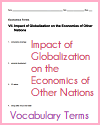| Impact of Globalization on the Economics of Other Nations Worksheets |
|---|
| www.studenthandouts.com ↣ Social Studies ↣ Economics ↣ Globalization |
 |  | |||||||||
| Impact of Globalization Vocabulary Terms | United States Trading Partners Chart Worksheet |
|
Globalization, the process of increased interconnectedness and interdependence among countries in terms of trade, investment, technology, culture, and more, has significant economic impacts. These effects can be both positive and negative and can vary depending on specific circumstances and policies. Here are some of the key economic impacts of globalization. Our free printable worksheets are here to assist teachers covering this critical area of study. Positive Economic Impacts:
Economic Growth: Access to larger markets and increased trade can promote economic growth by boosting production, generating employment opportunities, and attracting foreign investment. Technological Advancements: Globalization facilitates the flow of technology and innovation across borders. This can lead to improved productivity and competitiveness in various industries. Foreign Direct Investment (FDI): Foreign companies investing in other countries can create jobs, stimulate economic activity, and bring in new technologies and management practices. Consumer Benefits: Globalization often provides consumers with a wider range of products and services at lower prices. Increased competition can lead to more affordable goods. Economies of Scale: Globalization allows companies to achieve economies of scale by serving larger markets. This can lead to cost reductions and lower prices for consumers. Resource Allocation: Globalization can lead to more efficient allocation of resources, as countries can specialize in producing goods and services in which they have a comparative advantage.
Job Displacement: As companies seek cost savings and efficiency, they may outsource jobs or automate processes, leading to job displacement in certain industries or regions. Vulnerability to Global Shocks: Increased global interdependence can make economies more vulnerable to global economic shocks, such as financial crises or pandemics. Environmental Concerns: Globalization can lead to environmental challenges, such as increased resource consumption, pollution, and carbon emissions associated with global trade and production. Loss of Cultural Identity: The spread of global culture and mass media can sometimes erode local cultural identities, impacting the preservation of cultural heritage. Financial Market Volatility: Globalization can lead to increased volatility in financial markets, as events in one part of the world can quickly affect markets globally. Economic Dependence: Some countries may become overly dependent on specific industries or exports, making their economies vulnerable to fluctuations in global demand or prices for those products. Loss of Sovereignty: As countries become more integrated into the global economy, they may need to make concessions and compromises on domestic policies to comply with international agreements and regulations. |
| www.studenthandouts.com ↣ Social Studies ↣ Economics ↣ Globalization |








